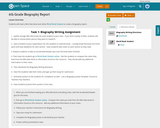
Students will read a Who Was Book and utilize World Book Student to create a biography report.
- Subject:
- Information, Media and Technological Literacy
- Material Type:
- Lesson Plan
- Author:
- Melissa Fortman
- Date Added:
- 04/18/2019

Students will read a Who Was Book and utilize World Book Student to create a biography report.

Get an overview of how AI technology works and discover six news literacy takeaways to keep in mind as these tools evolve.
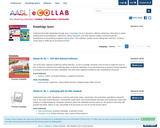
School librarians can improve their practice by expanding their interactions to peers from different countries and cultures. This issue explores how school librarians can increase their global competence. Articles address cultural intelligence, international school library guidelines, school library research from around the world, and more.

This lesson is an introduction to the research process using the Ask. Act. Achieve. process
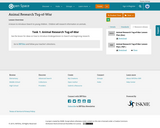
A lesson to introduce ISearch to young children. Children will research information on animals.
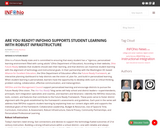
This is one in a series of Teach With INFOhio blog posts which aligns INFOhio's resources and web-based tools with Future Ready's Framework. The series of blog posts for Future Ready will be completed by August 2019.

This PDF handout provides examples and use cases for attributions and citations. The document explains the importance of giving credit to the sources of information in a project or research paper, and provides clear examples of how to cite sources in different formats, including books, websites, and videos. The examples are easy to follow and provide a useful guide for students who are new to citing sources. Overall, this document is a helpful resource for understanding the basics of attribution and citation in academic research.
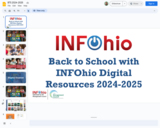
This is the annual back to school presentation for the 2024-2025 school year. These slides include updates and information about the INFOhio resources, web tools, and professional development.
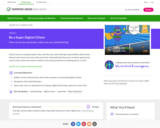
How can we be upstanders when we see cyberbullying? Online tools are empowering for kids, and they also come with big responsibilities. But do kids always know what to do when they encounter cyberbullying? Show your students appropriate ways to take action and resolve conflicts, from being upstanders to helping others in need. Approximately 45 mins.
LESSON OBJECTIVES: Reflect on the characteristics that make someone an upstanding digital citizen. Recognize what cyberbullying is. Show ways to be an upstander by creating a digital citizenship superhero comic strip.
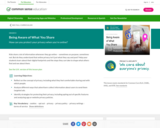
How can you protect your privacy when you're online? Kids share a lot of information whenever they go online -- sometimes on purpose, sometimes not. But do they understand that online privacy isn't just what they say and post? Help your students learn about their digital footprints and the steps they can take to shape what others find and see about them. Approximately 50 mins.
LESSON OBJECTIVES: Reflect on the concept of privacy, including what they feel comfortable sharing and with which people. Analyze different ways that advertisers collect information about users to send them targeted ads. Identify strategies for protecting their privacy, including opting out of specific features and analyzing app or website privacy policies.
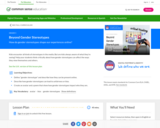
How do gender stereotypes shape our experiences online? Kids encounter all kinds of stereotypes in the media. But are kids always aware of what they're seeing? Help your students think critically about how gender stereotypes can affect the ways they view themselves and others. Approximately 45 mins.
LESSON OBJECTIVES: Define "gender stereotype" and describe how they can be present online. Describe how gender stereotypes can lead to unfairness or bias. Create an avatar and a poem that show how gender stereotypes impact who they are.
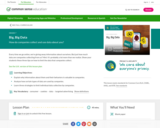
How do companies collect and use data about you? Every time we go online, we're giving away information about ourselves. But just how much data are companies collecting from us? Hint: It's probably a lot more than we realize. Show your students these three tips on how to limit the data that companies collect. Approximately 45 mins.
LESSON OBJECTIVES: Explain why information about them and their behaviors is valuable to companies. Analyze how certain types of data are used by companies. Learn three strategies to limit individual data collection by companies.
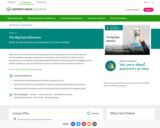
What are the benefits and drawbacks of online tracking? Many of us are aware that we're being tracked when we go online. It's one of the ways our favorite websites and apps know how to recommend content just for us. But how much information are companies actually collecting? And what are they doing with it? Digging into the details can help us make smart decisions about our online privacy and how to protect it. Approximately 50 mins.
LESSON OBJECTIVES: Define online tracking and describe how companies use it. Identify the benefits and drawbacks of online tracking to both companies and users. Analyze specific examples of online tracking and take a position for or against them.

This sample book trailer rubric offers suggestions for evaluating student created book trailers

This is a research article on the use of digital storytelling in education, which discusses the benefits of digital storytelling and provides examples of effective digital storytelling projects. The article also discusses the challenges and limitations of using digital storytelling in the classroom.

A storyboard template for creating book trailers. The template provides spaces for students to plan and organize the content of the book trailer, including visual and audio elements such as images, music, and narration. It also includes prompts for students to consider elements such as setting, characters, plot, and theme when planning their book trailer. The template is designed to be a helpful tool for students as they plan and create their book trailer projects.

This infographic offers six best practices to navigate fast-moving news stories, cut through the news and find accurate information.
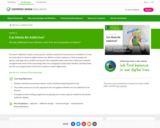
Are we addicted to our devices, and, if so, are companies to blame? The word "addiction" packs a heavy punch, and the research is inconclusive on whether it's truly accurate when it comes to digital device use. What's certain, however, is that as people use devices and apps more, profits increase for the companies who make them. Help your students recognize how most of the technology they use is designed to keep them hooked, and help them use this as an opportunity to find more balance in their digital lives. Approximately 60 mins.
LESSON OBJECTIVES: Analyze and draw conclusions about a series of photos depicting device use. Use online resources to track arguments for and against whether we are addicted to our devices. Complete a short writing assignment analyzing one or more aspects related to the device addiction debate.
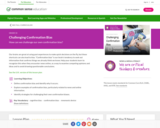
How can we challenge our own confirmation bias? Our brains are great at using past experiences to make quick decisions on the fly, but these shortcuts can also lead to bias. "Confirmation bias" is our brain's tendency to seek out information that confirms things we already think we know. Help your students learn to recognize this when they encounter news online, as a way to examine competing opinions and ideas and to avoid drawing questionable conclusions. Approximately 45 mins.
LESSON OBJECTIVES: Define confirmation bias and identify why it occurs. Explore examples of confirmation bias, particularly related to news and online information. Identify strategies for challenging their own confirmation biases.
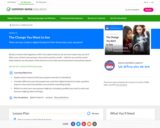
How can you create a digital footprint that showcases your purpose? Research shows that happiness in life is less about what you do and more about why you do it. When your actions have purpose, they lead to positive results -- both for you and the world. Help students use the power of the internet to turn their personal passions into positive impact. Approximately 50 mins.
LESSON OBJECTIVES: Explain what it means to find your purpose and why it is beneficial. Consider different ways that people have used their digital footprint to make a positive impact on the world and whether you would do something similar. Reflect on what your own purpose might be, including a problem you want to solve and how you might go about solving it.